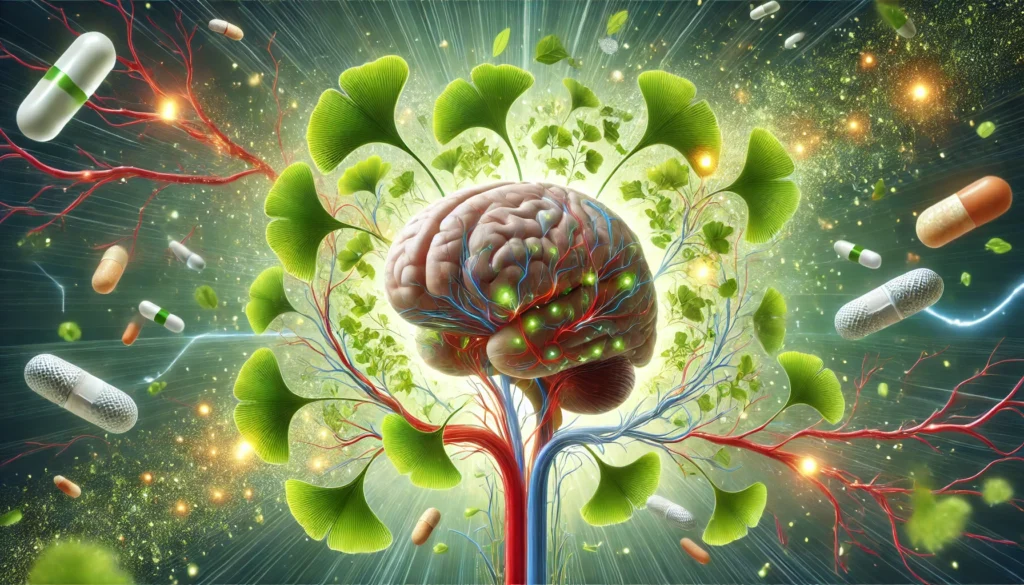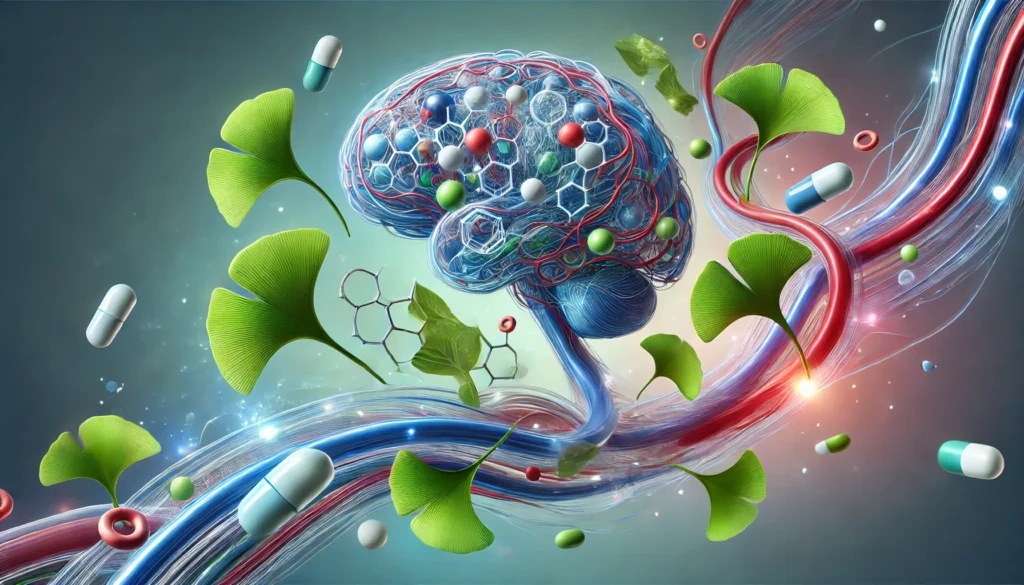The intricate workings of the human brain and cardiovascular system continue to captivate researchers, clinicians, and wellness enthusiasts alike. As the global population ages and cognitive decline becomes an increasingly prevalent concern, there is a growing interest in compounds that may support mental acuity and circulatory function. Among the many nutraceuticals and pharmaceuticals under scrutiny, aspirin and ginkgo biloba stand out for their individual benefits—and more recently, for their potential when used in tandem. While each of these compounds carries its own rich history and scientifically supported effects, the synergy of aspirin and ginkgo biloba has emerged as a subject worthy of deeper exploration, particularly in the context of cognitive enhancement and vascular health.
You may also like:Ginkgo Biloba Benefits for Creative Thinking: How This Ancient Herb Supports Cognitive Clarity and Focus
At the intersection of nootropics and circulatory support, this combination holds unique promise. Aspirin, well-known as an anti-inflammatory and antiplatelet agent, has long been used to prevent cardiovascular events such as heart attacks and strokes. Ginkgo biloba, an ancient botanical with roots in traditional Chinese medicine, is famed for its neuroprotective and vasodilatory properties. When used together in carefully considered dosages, these two agents may offer complementary effects that go beyond what either can achieve alone. However, as with any integrative health strategy, a nuanced understanding is essential. This article delves into the biochemical, clinical, and practical dimensions of using aspirin and ginkgo biloba in tandem, exploring their potential synergy while highlighting important considerations for safety and efficacy.

Understanding the Mechanisms of Aspirin: Anti-Inflammatory and Antiplatelet Roles
Aspirin, or acetylsalicylic acid, has a long-standing place in the pharmacopoeia as a first-line agent for pain relief, fever reduction, and cardiovascular protection. Its principal mechanism involves the irreversible inhibition of cyclooxygenase (COX) enzymes—specifically COX-1 and COX-2. These enzymes are critical in the biosynthesis of prostaglandins and thromboxanes, lipid compounds involved in inflammation and platelet aggregation. By blocking these pathways, aspirin effectively reduces inflammation and thins the blood, decreasing the likelihood of clot formation.
This antiplatelet action underpins aspirin’s widespread use in the prevention of ischemic events. Patients with a history of myocardial infarction or stroke often rely on low-dose aspirin therapy to reduce their risk of recurrence. Beyond its cardiovascular benefits, some research also suggests that aspirin may have neuroprotective properties, possibly due to its ability to reduce neuroinflammation—an emerging contributor to cognitive decline and neurodegenerative diseases such as Alzheimer’s and Parkinson’s. Although the relationship between aspirin and brain health is still being elucidated, its capacity to enhance cerebral blood flow and limit microvascular damage could play a role in preserving cognitive function over time.
The question then arises: can these vascular and anti-inflammatory properties translate into cognitive benefits, especially when paired with other agents that target the brain more directly? This is where ginkgo biloba enters the conversation.
Ginkgo Biloba and Its Cognitive Promise: A Botanical with Neurovascular Benefits
Ginkgo biloba, derived from the leaves of the ancient Ginkgo tree, has been utilized for centuries in traditional medicine to treat a range of ailments, particularly those related to cognition and circulation. Modern science has since confirmed many of these traditional uses, identifying a complex profile of active compounds—including flavonoids and terpenoids—that exhibit antioxidant, anti-inflammatory, and vasodilatory effects.
One of ginkgo biloba’s most well-studied effects is its ability to improve blood flow, particularly in the cerebral vasculature. By promoting vasodilation and reducing blood viscosity, ginkgo may enhance oxygen and nutrient delivery to brain tissue. This improved perfusion is believed to support memory, attention, and overall cognitive clarity, especially in aging populations or those experiencing mild cognitive impairment. Additionally, the antioxidant properties of ginkgo help combat oxidative stress—a major contributor to neuronal aging and damage.
Clinical studies investigating ginkgo’s efficacy in cognitive enhancement have produced mixed but promising results. While some meta-analyses have found modest improvements in memory and executive function, others suggest that the effects may be more pronounced in specific subgroups, such as older adults or those in the early stages of dementia. Importantly, ginkgo appears to exert its benefits without the sedative or stimulant effects commonly associated with other nootropics, making it an appealing option for long-term use.
Given its vascular and neuroprotective properties, the pairing of ginkgo biloba with aspirin becomes a logical progression in the pursuit of holistic brain and heart health. Yet this combination is not without its complexities, particularly when considering their shared influence on blood flow and platelet function.

Frequently Asked Questions: Aspirin and Ginkgo Biloba for Cognitive Health and Circulation
1. Can aspirin and ginkgo biloba be used as a preventive strategy for age-related cognitive decline?
While research is still evolving, some emerging studies suggest that combining aspirin and ginkgo biloba may offer protective effects against age-related cognitive deterioration. This duo appears to enhance microcirculation and reduce neuroinflammation—two key factors in preserving brain health with age. However, their long-term preventive use should be tailored to individual risk profiles, particularly for those with comorbidities such as diabetes or hypertension. Unlike traditional pharmacological treatments, the aspirin and ginkgo biloba combination may exert more subtle, cumulative benefits, potentially delaying cognitive decline rather than reversing existing damage. Integrating this approach with lifestyle changes like exercise and mental stimulation can further amplify its protective effects.
2. Are there specific cognitive domains that benefit more from the ginkgo aspirin combination?
Yes, preliminary evidence suggests that the pairing of ginkgo aspirin may be particularly effective in enhancing domains related to executive function and working memory. These areas of cognition are often among the first to show signs of deterioration in mild cognitive impairment. By improving blood flow and reducing oxidative stress, the combination may support neurotransmitter efficiency and synaptic plasticity, both critical to these cognitive processes. Individuals engaged in complex problem-solving, such as academics or professionals in high-stakes fields, may find targeted cognitive enhancements more noticeable. Importantly, effects may vary depending on baseline cognitive status and vascular health.
3. How might aspirin and ginkgo biloba impact creative thinking and mental flexibility?
Although not widely discussed in mainstream studies, anecdotal reports and early-stage research suggest that aspirin and ginkgo biloba might play a role in enhancing creative cognition. Ginkgo’s influence on cerebral blood flow may enhance connectivity between brain regions, potentially fostering divergent thinking and mental fluidity. Aspirin, through its anti-inflammatory effects, might reduce cognitive fatigue that can dampen creative energy. When used together, the ginkgo aspirin pairing may create a more receptive neural environment for spontaneous insights and problem reframing. These benefits could be particularly valuable in fields that require innovation, such as design, entrepreneurship, and research.
4. What are the potential long-term risks of using aspirin and ginkgo biloba together?
The most significant concern with the long-term use of aspirin and ginkgo biloba is an elevated risk of bleeding, particularly gastrointestinal or intracranial hemorrhage. Both agents independently reduce platelet aggregation, and their combination may compound this effect. Individuals with clotting disorders, those on blood thinners, or people over the age of 70 should approach this combination with caution and under medical supervision. Additionally, the long-term use of ginkgo supplements may interact with medications such as anticonvulsants and antidepressants, warranting periodic review of the full therapeutic regimen. Despite these risks, with careful dosage and medical guidance, many individuals can safely benefit from the combined use of these compounds.
5. Is there a difference between natural ginkgo extracts and standardized formulas when used with aspirin?
Yes, the source and quality of ginkgo biloba extract significantly influence its interaction profile when paired with aspirin. Standardized extracts such as EGb 761 contain consistent levels of active flavonoids and terpenoids, which makes them more predictable in terms of efficacy and safety. Natural or non-standardized forms may vary widely in potency, potentially increasing the risk of adverse effects or reducing therapeutic impact. When using the aspirin and ginkgo biloba combination, it’s advisable to choose a product from a reputable manufacturer that provides third-party testing and quality assurance. This ensures that both the benefits and risks are clearly understood and managed.
6. How does the timing of dosing affect the efficacy of ginkgo aspirin supplementation?
Dosing timing can influence how the body metabolizes and responds to both aspirin and ginkgo biloba. For instance, taking aspirin in the evening has been associated with better cardiovascular outcomes due to the circadian rhythm of platelet activity. Ginkgo biloba, on the other hand, may be more beneficial when taken in the morning or early afternoon to align with periods of peak cognitive demand. When used together, coordinating the timing to balance vascular benefits and cognitive clarity can optimize outcomes. Some integrative practitioners recommend splitting the dose—aspirin at night, ginkgo in the morning—to reduce bleeding risk while preserving daytime mental sharpness.
7. Can athletes or high-performers benefit cognitively or physically from using this combination?
Athletes and high-performance individuals may find the ginkgo aspirin combination useful not only for cognitive edge but also for endurance and recovery. Improved microcirculation from ginkgo may enhance oxygen delivery to muscle tissue, while aspirin’s anti-inflammatory properties could mitigate exercise-induced inflammation. The synergistic effects may support clearer decision-making under physical stress and reduce mental fatigue during prolonged activity. However, competitive athletes must be cautious, as certain athletic organizations may restrict the use of supplements that affect platelet function. As always, individualized guidance is essential, particularly for those balancing cognitive demands with high physical output.
8. What role does aspirin and ginkgo biloba play in supporting individuals recovering from transient ischemic attacks (TIAs)?
For individuals recovering from TIAs, also known as mini-strokes, supporting vascular health is paramount. Aspirin is often prescribed to prevent future events by reducing clot formation. Ginkgo biloba may complement this by enhancing cerebral circulation and aiding recovery of cognitive function post-ischemia. Emerging data suggests that ginkgo’s antioxidant and neuroprotective qualities might help reduce the severity of long-term cognitive deficits following TIAs. While this makes the aspirin and ginkgo biloba combination potentially useful in rehabilitation, it should always be implemented under close neurological supervision to avoid over-thinning the blood.
9. Are there gender-specific considerations when using ginkgo aspirin combinations?
Recent studies have started to examine how men and women may metabolize supplements and medications differently, and this applies to aspirin and ginkgo biloba as well. For example, hormonal differences can affect vascular tone and platelet responsiveness, potentially altering how each gender experiences the effects of the combination. Some evidence suggests that women, particularly postmenopausal women, might derive more pronounced cognitive benefits from ginkgo, while also facing a slightly elevated bleeding risk with aspirin. These nuances underscore the importance of personalized medical guidance when using the ginkgo aspirin combination. Hormonal status, body weight, and coexisting conditions should all be considered in risk-benefit assessments.
10. How might future research expand our understanding of the ginkgo aspirin combination?
Future research is likely to focus on better defining the ideal dosing protocols and identifying biomarkers that can predict responsiveness to the aspirin and ginkgo biloba combination. Advances in precision medicine may also help isolate the subpopulations that benefit most, such as individuals with specific genetic polymorphisms related to inflammation or endothelial function. Longitudinal studies are needed to explore how sustained use affects cognitive trajectory over decades, not just months. There’s also growing interest in integrating neuroimaging and AI-driven cognitive testing to quantify the real-time impacts of this pairing. As interest in integrative and preventive neurology expands, ginkgo aspirin regimens may evolve into more personalized, evidence-backed tools in cognitive health strategies.

Exploring the Synergy: How Aspirin and Ginkgo Biloba May Complement Each Other
The idea of combining aspirin and ginkgo biloba is rooted in their complementary mechanisms. Aspirin’s ability to inhibit platelet aggregation can reduce the risk of blood clots and promote more consistent blood flow throughout the body, including the brain. Meanwhile, ginkgo enhances microcirculation and oxygenation, potentially supporting neuronal activity and cognitive performance. When taken together in appropriate doses, these agents may provide a dual-action approach to optimizing cerebral perfusion and reducing vascular-related cognitive decline.
Preclinical studies suggest that the combination may have additive effects on blood viscosity and endothelial function. Ginkgo’s terpenoids, particularly ginkgolides, are known to antagonize platelet-activating factor (PAF), which may further inhibit clot formation without necessarily amplifying aspirin’s effect to a dangerous degree. However, the theoretical benefits must be weighed against the increased risk of bleeding, especially in individuals who are already on anticoagulant therapies or have underlying clotting disorders.
A growing body of clinical research has begun to examine the cognitive outcomes of using ginkgo and aspirin together, although large-scale, randomized trials remain limited. Some studies have reported improvements in attention, working memory, and processing speed in populations receiving both agents, compared to either alone. The hypothesis is that by enhancing cerebral blood flow and mitigating inflammation concurrently, the brain is better equipped to maintain function in the face of age-related decline or vascular insufficiency.
Still, caution is warranted. Not all studies agree on the degree of benefit, and individual responses can vary widely based on genetics, lifestyle, comorbidities, and medication history. As such, anyone considering the use of this combination should do so under the guidance of a healthcare provider familiar with both herbal supplements and conventional pharmacology.
Further Reading:
12 Possible Benefits of Ginkgo Biloba, Plus Side Effects and Dosage
Ginkgo Biloba Plus Aspirin May Alleviate Cognitive Deficits After Stroke
nootropic supplements, brain circulation support, neurovascular health, cognitive enhancement supplements, memory support herbs, natural blood thinners, age-related cognitive decline, herbal brain boosters, microcirculation improvement, cerebral blood flow, antioxidant brain support, brain health in aging, cognitive performance enhancers, integrative cognitive strategies, natural neuroprotective agents, vascular dementia prevention, plant-based cognitive enhancers, inflammation and brain health, nootropic stacks for seniors, mental clarity supplements
.Important Note: The information contained in this article is for general informational purposes only, and should not be construed as health or medical advice, nor is it intended to diagnose, prevent, treat, or cure any disease or health condition. Before embarking on any diet, fitness regimen, or program of nutritional supplementation, it is advisable to consult your healthcare professional in order to determine its safety and probable efficacy in terms of your individual state of health.
Regarding Nutritional Supplements Or Other Non-Prescription Health Products: If any nutritional supplements or other non-prescription health products are mentioned in the foregoing article, any claims or statements made about them have not been evaluated by the U.S. Food and Drug Administration, and such nutritional supplements or other health products are not intended to diagnose, treat, cure, or prevent any disease.


